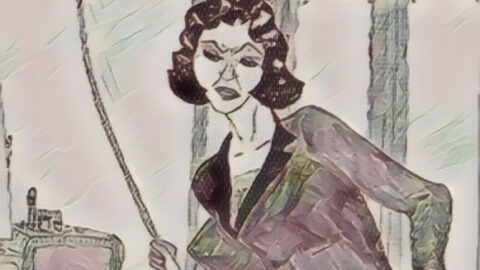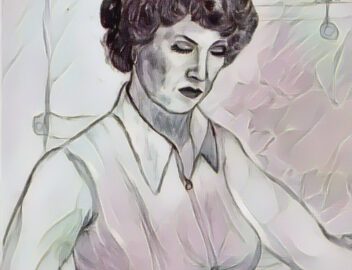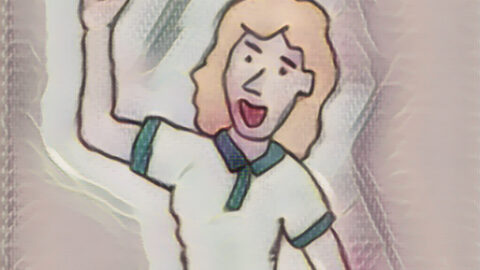Once upon a time, in a quiet, sunlit suburb, there lived a little girl named Susan and her younger sister, Judy.
Their father, a tall and gentle man who loved crossword puzzles, was to have an operation at the city hospital.
Their mother, Mrs. Johnson, a petite lady with bright blue eyes and a determined chin, decided that the girls should stay with their grandmother, Mrs. Thompson, while she cared for Father.
The girls’ grandmother lived in a sturdy brick house, always smelling faintly of lavender and lemon polish. The garden was a patchwork of roses and marigolds, and the grass was always neatly trimmed.
The air was filled with the gentle hum of cicadas in the late afternoon.
Grandmother was a lady of good habits and gentle authority. Her silver hair was always pinned in a neat bun, and her face, though lined with age, was softened by kind, watchful eyes.
She wore floral dresses and sensible shoes, and her posture was always upright and dignified. Her hands, though wrinkled, were strong from years of hard work.
She spoke in a soft but unwavering voice, and though she rarely raised it, her words were always obeyed. Susan always felt safe with her grandmother, but she knew that safety came with rules.
And one afternoon, Susan was to learn a very important lesson indeed.
That morning, Susan awoke in a tangle of stiff cotton sheets, sunlight streaming through the lace curtains.
Susan was a wiry, brown-haired girl of about eight, with a stubborn streak and a lively imagination.
She could hear the clatter of breakfast dishes and the gentle music of Perry Como on the radio.
Susan did not wish to go to school. Her stomach twisted at the thought of arithmetic and the stern gaze of Miss Parker, her teacher, who was tall and angular, with tightly coiled hair and a reputation for strictness.
“No dawdling, girls,” Grandmother said kindly. “The world will not wait for you.”
The walk to school seemed endless. Susan’s shoes pinched her heels, and her mood grew darker with every step.
Judy, her younger sister, was a cheerful child with a gap-toothed grin and a habit of humming to herself. She skipped along, her pigtails bouncing, quite untroubled by the day.
When Susan returned that afternoon, she felt the weight of the day upon her. She had been cheeky in class, speaking out of turn, and as punishment, Miss Parker kept her inside during recess. Susan watched the other children play through the window, their laughter floating in on the spring breeze, and she felt a hot, prickly shame settle in her chest.
That evening, dinner was a steaming bowl of lentils, thick and brown, with a slice of buttered bread. The kitchen was warm, and the ticking of the wall clock was loud in the silence.
Judy sat across from Susan, swinging her legs and humming, her cheeks rosy from the day.
Susan stared at her plate, arms folded, the smell of lentils making her nose wrinkle.
Grandmother set her own plate down and looked at Susan over her glasses, her expression patient but firm. “Susan, you must eat your supper,” she said gently. “Let us have no nonsense tonight.”
Susan glared at the lentils, wishing they would disappear. Her stomach churned with stubbornness. “I do not like lentils,” she muttered, barely above a whisper.
Grandmother’s eyes narrowed just a little, her lips pressing into a thin line. “You shall not leave this table until your plate is clean, young lady.” Her words hung in the air, heavy as a thundercloud.
Susan poked at the lentils with her fork, hoping for a miracle. The kitchen felt smaller, the ticking clock louder. She imagined the world outside—the garden bathed in golden light, the distant sound of a neighbour’s lawnmower.
Then, suddenly, the telephone rang, its bell echoing down the hallway. Grandmother rose, smoothing her dress, her movements precise and unhurried. “Do not touch a thing,” she warned, and disappeared to answer the call.
Susan’s heart beat quickly. This was her chance. She slipped from her chair, careful not to make a sound, and tiptoed into the kitchen. The linoleum was cool beneath her feet. She scraped the lentils into the bin, the clatter of the spoon sounding terribly loud. She rinsed her plate, wiped it dry, and set it back on the table, utensils neatly placed together—just as she had been taught. She slid back into her seat, trying to look as innocent as possible, her heart thumping in her ears.
But Susan had not counted on Judy’s sharp eyes. Judy watched her with curiosity and suspicion, her lips pursed in a way that made her look older than her years.
The moment Grandmother returned, Judy’s voice rang out, high and clear: “Grandmother, Susan threw her dinner in the bin!” Susan’s heart sank. She looked at Judy with hurt and surprise, but Judy only shrugged, swinging her legs a little faster, her face innocent but with a glimmer of mischief.
Grandmother fixed Susan with a look that could freeze water. Her blue eyes, usually so gentle, now blazed with disappointment. She marched into the kitchen, her footsteps echoing on the linoleum. There, she found the evidence: the lentils in the bin. She returned to the table, her face grave. “Susan, you have been both disobedient and deceitful. You know very well that in this house, we do not waste food, nor do we tell untruths.”
With a determined look, Grandmother quietly removed her slipper, holding it up for Susan to see. She approached Susan with calm authority, her steps measured and her face set in a firm, no-nonsense expression. Gently but firmly, she guided Susan to stand and bend over the edge of the chair. Then, with a swift but controlled motion, Grandmother delivered a single, sharp smack to Susan’s bottom with the slipper—enough to sting, but not to harm. The sound echoed in the quiet kitchen, and Susan’s eyes widened in surprise and embarrassment. It was an old-fashioned lesson, delivered with dignity and care, and one Susan would not soon forget.
Grandmother’s slipper was a sturdy, old-fashioned house slipper—soft brown leather, well-worn at the heel, with a faded floral pattern stitched across the top. The sole was thick but flexible, shaped by years of careful steps around her tidy home. It was the sort of slipper that spoke of comfort and order, but in Grandmother’s hand, it became a symbol of her firm resolve and loving discipline.
For Susan, the slipper felt both sharp and startling—a quick, stinging heat that faded almost as soon as it came. But the memory of it, and the lesson behind it, lingered much longer than the sting itself.
Grandmother sat quietly for a moment, her heart heavy with disappointment. She had hoped never to use such stern discipline, but felt it was her duty to teach Susan right from wrong. As she looked at Susan, her eyes were filled with sadness and regret, wishing there had been another way. It pained her deeply to have to give a darn good slippering, but she knew it was done out of love and a hope for Susan to learn an important lesson.






























































